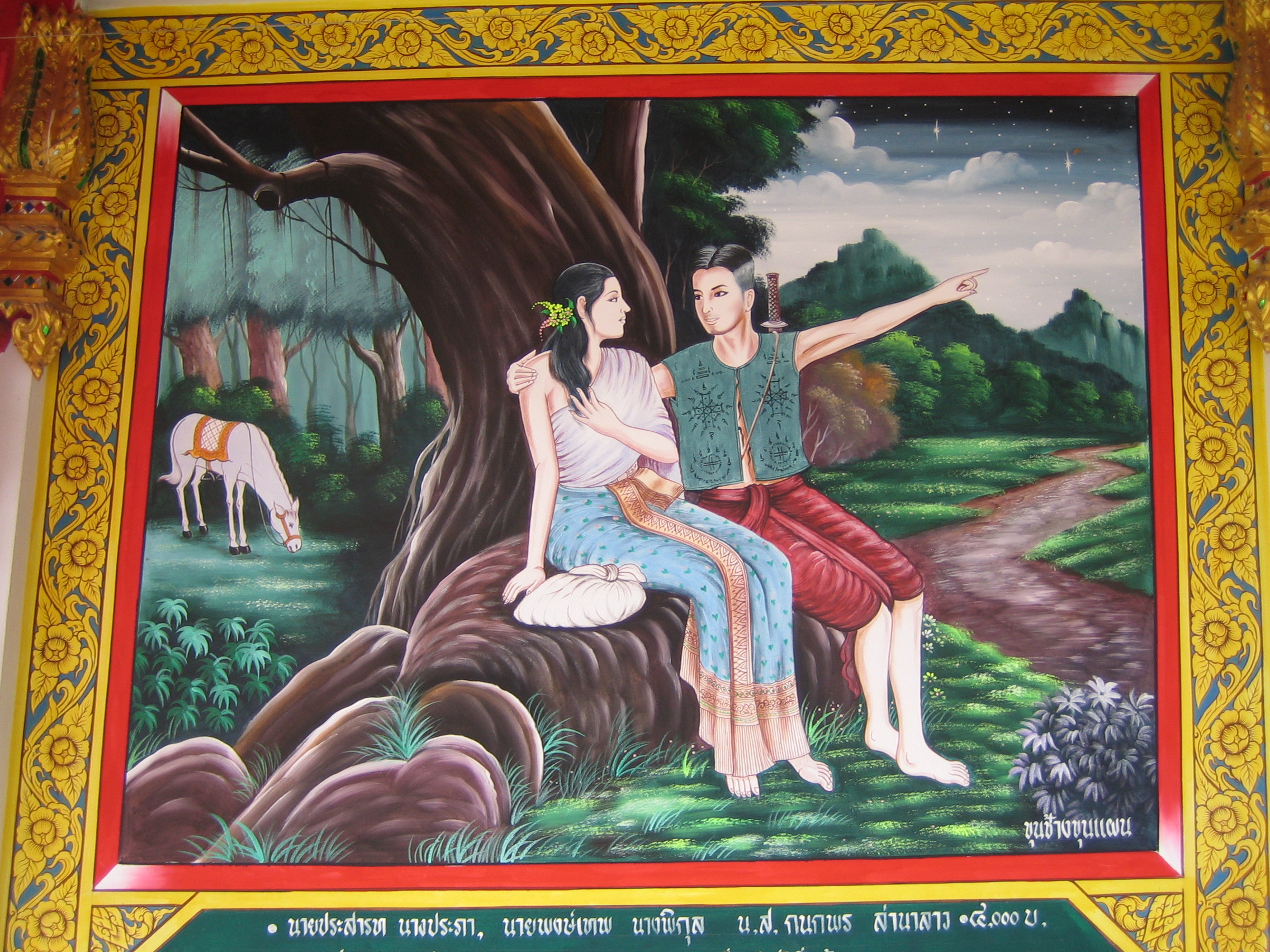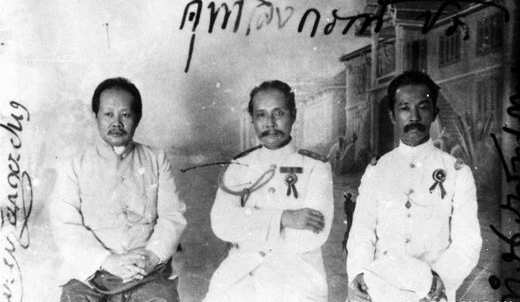|
Khun Chang Khun Phaen
''Khun Chang Khun Phaen'' ( th, ขุนช้างขุนแผน, ) is a long Thai epic poem which originated from a legend of Thai folklore and is one of the most notable works in Thai literature. The work's entire length is over 20,000 couplets. Khun Chang and Khun Phaen are the leading male characters, where " Khun" was a junior feudal title given for male commoners. The story recounts the adventurous and amorous struggles of the three main protagonists. Much of their relationship can be described as a love triangle. Khun Phaen (dashing but poor) and Khun Chang (rich but ugly) compete for the lovely Wanthong from childhood for over fifty years. Their stories transpire amid the larger backdrop of national events, including two wars, several abductions, a suspected revolt, an idyllic sojourn in the forest, two court cases, trial by ordeal, jail, and treachery. Ultimately the King of Ayutthaya condemns Wanthong to death for failing to choose between the two men. The KCK ... [...More Info...] [...Related Items...] OR: [Wikipedia] [Google] [Baidu] |
Thailand
Thailand ( ), historically known as Siam () and officially the Kingdom of Thailand, is a country in Southeast Asia, located at the centre of the Indochinese Peninsula, spanning , with a population of almost 70 million. The country is bordered to the north by Myanmar and Laos, to the east by Laos and Cambodia, to the south by the Gulf of Thailand and Malaysia, and to the west by the Andaman Sea and the extremity of Myanmar. Thailand also shares maritime borders with Vietnam to the southeast, and Indonesia and India to the southwest. Bangkok is the nation's capital and largest city. Tai peoples migrated from southwestern China to mainland Southeast Asia from the 11th century. Indianised kingdoms such as the Mon, Khmer Empire and Malay states ruled the region, competing with Thai states such as the Kingdoms of Ngoenyang, Sukhothai, Lan Na and Ayutthaya, which also rivalled each other. European contact began in 1511 with a Portuguese diplomatic mission to Ayuttha ... [...More Info...] [...Related Items...] OR: [Wikipedia] [Google] [Baidu] |
Sunthorn Phu
Phra Sunthorn Vohara (Phu) ( th, พระสุนทรโวหาร (ภู่), , ; 26 June 1786 – 1855), known as Sunthorn Phu ( th, สุนทรภู่, , ), is Thailand's best-known royal poet. He wrote during the Rattanakosin period. Phu's career as a royal poet began in the reign of King Rama II, and when the king died, he resigned from the role and became a monk. Twenty years later, in the reign of King Rama III, he returned to court as a royal scribe, where he remained for the rest of his life. Phu was renowned for composing verse, and his epic poetry is popular in Thailand to the present day. His works include ''Nirat Phukhao Thong'', a collection of poems recounting his journey to the Golden Mountain; ''Nirat Suphan'', his journey to Suphan Buri province; and the ''Phra Aphai Mani'' saga. Biography Sunthorn Phu was born in the reign of King Rama I, on 26 June 1786 ( year of the Horse), around 8.00 a.m. His family's house was behind the royal palace, ne ... [...More Info...] [...Related Items...] OR: [Wikipedia] [Google] [Baidu] |
Thai New Year
Songkran ( th, เทศกาลสงกรานต์, ) is the Thai New Year's national holiday. Songkran is on 13 April every year, but the holiday period extends from 14 to 15 April. In 2018 the Thai cabinet extended the festival nationwide to five days, 12–16 April, to enable citizens to travel home for the holiday. In 2019, the holiday was observed 12–16 April as 13 April fell on a Saturday. The word "Songkran" comes from the Sanskrit word ', literally "astrological passage", meaning transformation or change. It coincides with the rising of Aries on the astrological chart and with the New Year of many calendars of South and Southeast Asia, in keeping with the Hindu Calendar and Buddhist calendar. The New Year takes place at virtually the same time as the new year celebrations of many countries in South Asia like Bangladesh, Cambodia, China (Dai People of Yunnan Province), India (Baisakhi in Punjab, Bengal Gajan Utsav, Bengal Charak Utsav, Bengali New Year (Po ... [...More Info...] [...Related Items...] OR: [Wikipedia] [Google] [Baidu] |
Ayutthaya Kingdom
The Ayutthaya Kingdom (; th, อยุธยา, , IAST: or , ) was a Siamese kingdom that existed in Southeast Asia from 1351 to 1767, centered around the city of Ayutthaya, in Siam, or present-day Thailand. The Ayutthaya Kingdom is considered to be the precursor of modern Thailand and its developments are an important part of the History of Thailand. The Ayutthaya Kingdom emerged from the mandala of city-states on the Lower Chao Phraya Valley in the late fourteenth century during the decline of the Khmer Empire. After a century of territorial expansions, Ayutthaya became centralized and rose as a major power in Southeast Asia. Ayutthaya faced invasions from the Toungoo dynasty of Burma, starting a centuries' old rivalry between the two regional powers, resulting in the First Fall of Ayutthaya in 1569. However, Naresuan ( 1590–1605) freed Ayutthaya from brief Burmese rule and expanded Ayutthaya militarily. By 1600, the kingdom's vassals included some city-states ... [...More Info...] [...Related Items...] OR: [Wikipedia] [Google] [Baidu] |
Suphanburi
Suphan Buri () is a town (''thesaban mueang'') in central Thailand. It covers ''tambon'' Tha Philiang and parts of ''tambons'' Rua Yai and Tha Rahat, all within the Mueang Suphan Buri District. As of 2006 it had a population of 26,656. The town is 101 km north-northwest of Bangkok. Geography Suphan Buri lies on the Tha Chin River (known locally as the ''Suphan River''), at an elevation of . The surrounding area is low-lying and flat, with rice farms covering much of the land. Climate Suphan Buri has a tropical wet and dry climate (Köppen climate classification ''Aw''). Winters are quite dry and very warm. Temperatures rise until April, which is very hot with the average daily maximum at . The monsoon season runs from May through October, with heavy rain and somewhat cooler temperatures during the day, although nights remain warm. History 19th-century Siamese historian and statesman Damrong Rajanubhab speculated that the city was founded under the name Suvarnapurī arou ... [...More Info...] [...Related Items...] OR: [Wikipedia] [Google] [Baidu] |
Topical Joke
The topical humor and topical jokes is humor framed around a specific topic related to current events or dealing with issues that are important or popular at the current time. The value of this kind of humor often diminishes when the topic is no longer widely discussed in public.Liisi Laineste, "Teke it with a Grain of Salt: The Kernel of Truth in Topical Jokes", Besides jokes, topical humor may be in forms of news parody, "Top 10" lists, demotivators, cartoons, etc. Sometimes old jokes may be turned into topical ones due to the newly acquired salience. Liisi Laineste of Estonian Literary Museum writes that topical jokes and news parodies emphasize the need to look critically at the flow of the news. Sigmund Freud Sigmund Freud described the "topicality"The English term "topicality" is used in the translation by Joyce Crick. The translation by Abraham Brill uses the term "actuality", see wikisource:Wit and its relation to the unconscious/IV" aspect of jokes in his book ''J ... [...More Info...] [...Related Items...] OR: [Wikipedia] [Google] [Baidu] |
Samut Thai
Folding-book manuscripts are a type of writing material historically used in Mainland Southeast Asia, particularly in the areas of present-day Myanmar, Thailand, Laos and Cambodia. They are known as ''parabaik'' in Burmese,; . ''samut thai'' in Thai, , 'Thai books'. or ''samut khoi'' in Thai and Lao,, ; lo, ສະໝຸດຂ່ອຍ; '''khoi'' books', for those made with ''khoi'' paper. ''phap sa'' in Northern Thai and Lao,; 'folded mulberry paper', for those made with mulberry paper. and ''kraing'' in Khmer., . The manuscripts are made of a thick paper, usually of the Siamese rough bush (''khoi'' in Thai and Lao) tree or paper mulberry, glued into a very long sheet and folded in a concertina fashion, with the front and back lacquered to form protective covers or attached to decorative wood covers. The unbound books are made in either white or black varieties, with the paper being undyed in the former and blackened with soot or lacquer in the latter. Myanmar Along with pap ... [...More Info...] [...Related Items...] OR: [Wikipedia] [Google] [Baidu] |
Damrong
Prince Tisavarakumarn, the Prince Damrong Rajanubhab (Thai: ; Full transcription is "Somdet Phrachao Borommawongthoe Phra-ongchao Ditsawarakuman Kromphraya Damrongrachanuphap" (สมเด็จพระเจ้าบรมวงศ์เธอ พระองค์เจ้าดิศวรกุมาร กรมพระยาดำรงราชานุภาพ)) (21 June 1862 – 1 December 1943) was the founder of the modern Thai educational system as well as the modern provincial administration. He was an autodidact, a (self-taught) historian, and one of the most influential Thai intellectuals of his time. Born as ''Phra Ong Chao Tisavarakumarn'' (พระองค์เจ้าดิศวรกุมาร; "Prince Tisavarakumarn"), a son of King Mongkut with Consort Chum (เจ้าจอมมารดาชุ่ม; Chao Chom Manda Chum), a lesser royal wife; he initially learned Thai and Pali from private tutors, and English at the Royal School with Mr. F ... [...More Info...] [...Related Items...] OR: [Wikipedia] [Google] [Baidu] |
Si Suriyawongse
Somdet Chaophraya Borom Maha Sri Suriwongse ( th, สมเด็จเจ้าพระยาบรมมหาศรีสุริยวงศ์, , ; also spelled ''Suriyawong'', etc.; 23 December 1808 – 19 January 1883), whose personal name was Chuang Bunnag (; ; ), was a prominent 19th century Thai figure who served as the regent during the early years of the reign of King Chulalongkorn. Biography Chuang Bunnag ( th, ช่วง บุนนาค) was born on 23 December 1808 to Tish Bunnag and his main wife Lady Chan, who was a daughter of ''Chao Phraya'' Pollathep Thongin, at Chuang's grandfather residence off the southern wall of the Grand Palace near modern Wat Pho, Phra Nakhon District. Chuang was a member of Bunnag family who had descended from Sheikh Ahmad the Persian minister of King Prasat Thong (His lineage had converted to Theravada Buddhism in the mid-eighteenth century.). In 1818, the Grand Palace expanded south and Bunnags moved to their new residen ... [...More Info...] [...Related Items...] OR: [Wikipedia] [Google] [Baidu] |
Samuel Smith (missionary)
Samuel Smith may refer to: In politics *Samuel Smith (Connecticut politician) (1646–1735), early settler of Norwalk, Connecticut and deputy of the General Assembly of the Colony of Connecticut in 1691 *Samuel Smith (1754–1834), British Member of Parliament for Leicester, Malmesbury, Midhurst, St Germans and Wendover *Samuel Smith (1755–1793), British Member of Parliament for Worcester, Ludgershall and Ilchester * Samuel Smith (North Carolina), 18th-century North Carolina politician *Samuel Smith (Liberal politician) (1836–1906), British Member of Parliament for Liverpool, 1882–1885 and Flintshire, 1886–1906 *Samuel Smith Jr., American politician; Democratic member of the Indiana Senate, 1998–2008 * Samuel Hardman Smith (1868–1956), Canadian politician; municipal politician in Edmonton *Samuel Smith (Australian politician) (1857–1916), member of the New South Wales Legislative Assembly * Samuel Smith (New York politician), mayor of the City of Brooklyn, New York, 18 ... [...More Info...] [...Related Items...] OR: [Wikipedia] [Google] [Baidu] |

.jpg)
_of_Wat_Phra_Si_Sanphet.jpg)


